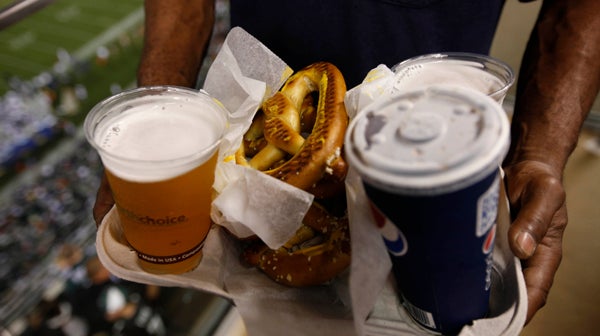Football fans engage in emotional eating after team’s loss, study finds

(Matt Rourke/AP Photo, file)
Football season is about to begin — and fans, beware. New research finds that your team’s defeat could lead to increased consumption of fatty foods and higher calorie intake.
Researchers at INSEAD Business School used data from thousands of Americans who tracked everything they ate, on every day of the week. They then cross-checked that data with people’s locations, and how the region’s football team did on Sunday.
The outcome of the game affected how much — and what — people ate, said researcher Pierre Chandon.
“On a Monday following a defeat, saturated fat consumption went up by 16 percent, and calorie consumption went up by 10 percent,” explained Chandon, who teaches at the school’s campus in France. “But when the team, the home team won, then it was the opposite.”
On winning days, people ate healthier food, and consumed fewer calories. To make sure this wasn’t just a “Monday” thing, Chandon and his colleagues studied control regions that didn’t have a football team, or where the team didn’t play that weekend — and food consumption didn’t change.
Loss delivers blow to ego
Chandon says that the uptick in food consumption on losing days could be because fans feel defeated and turn to comfort foods for solace.
“If you’re a fan, your team is part of your identity. In fact, you don’t say ‘they lost’ you say ‘we lost’ and so, ‘I lost.'” said Chandon. “And so you you don’t feel so good about yourself after a defeat, and people head for the fridge and choose the comfort food as a way to cope with the defeat and the identity threat.”
Chandon said the effects were especially pronounced when the team’s loss was unexpected or narrow. In another study he conducted, a simple measure negated the impact of a team’s loss on fans’ eating habits.
Fans were asked to remind themselves of other things that they cared about and that were important to them, which Chandon said seemed to curb mindless eating after defeat.
WHYY is your source for fact-based, in-depth journalism and information. As a nonprofit organization, we rely on financial support from readers like you. Please give today.

